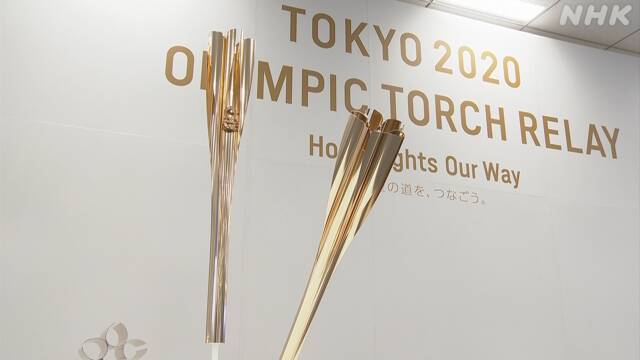Regarding the Tokyo Organizing Committee for the Torch of the Olympic Games, the Organizing Committee of the Games will suspend the relays in which people run and bring in the torch if an emergency declaration is issued during that period in the prefecture where the relay is held. I found out that I was considering an alternative plan that would be connected to the next one by telling the executive committee of each prefecture.
The postponed Tokyo Olympic torch relay will start in Fukushima Prefecture on March 25 and will travel nationwide over 121 days, and as the start approaches about two months later, prevention of infection with the new coronavirus Countermeasures are an issue.
The Organizing Committee will run on public roads where people will run and connect if it is necessary to reduce the scale of the relay in the prefectures where the relay is carried out, such as when a state of emergency is declared or a person is required to refrain from going out during that period. As an alternative, we will inform the executive committees of each prefecture and consider a plan to bring the holy fire to the celebration venue where the holy fire arrives at the end of the day, hold only the event, and connect it to the next. I found out by interviewing the people concerned.
The relay implementation method is that the organizing committee and the executive committee make a decision 30 days before the relay starts in each prefecture, and if the decision cannot be made, the discussion will be held again.
An official of the Organizing Committee said, "This is not the cancellation of the torch relay. If the infection situation is bad, we will give top priority to safety and carry the torch through a relay that connects to the next prefecture."
Torch relay Approximately 10,000 people will participate all over the country
The torch relay plays a role in spreading the momentum of the Olympic Games nationwide by running around 10,000 people selected from a wide range of people of different ages and genders.
The Tokyo Olympic torch was transported from Greece to Japan in March last year, and after the postponement was decided, it toured 14 prefectures until March and is exhibited at facilities and plazas.
The Games Organizing Committee plans to visit 859 cities, wards, towns and villages nationwide over 121 days, as it was before the postponement, and will start from Fukushima Prefecture on March 25, about two months later.
Some voices of anxiety about the implementation of the torch relay from "Torch Runner"
Under these circumstances, due to the spread of infection worldwide and the declaration of emergency, some torchbearers have begun to raise concerns about the implementation of the torch relay.
Ryo Matsumoto (21), a fourth-year student at Nippon Sport Science University, who lives in Kawasaki City, was selected as a torchbearer last year and is scheduled to run in his hometown of Fukushima Prefecture on March 25, the first day of the relay.
In late last month, when I received an email from the Games Organizing Committee confirming my intention to participate again in an attempt to promote a minor competition that is not held at the Olympic Games as a Japanese national team player of Sepak Takraw, a ball game originating in Southeast Asia, I replied "I will run". Did.
However, he said that he became worried about whether the torch relay, which was approaching two months later, could really be done as he saw the news about the spread of the infection every day after the state of emergency was declared.
Mr. Matsumoto himself went online for university classes and went to campus in Tokyo for only one day this year, and the educational training scheduled for obtaining a teacher's license was cancelled.
As for the activities of the Japanese representative of Sepak Takraw, it became difficult to secure a gymnasium due to the state of emergency, so practice and national competitions were canceled, and the opportunity for the next game is gone until summer, forcing changes in life.
Mr. Matsumoto still wants to run if the torch relay is implemented, but he is no longer talking about it with his family and friends, and his enthusiasm for the torch relay has diminished due to preparations for working life starting in spring. It is said that it is.
Mr. Matsumoto said, "In the situation where there are more infected people than at the time of the first state of emergency, the torch relay is not easy, and calling people from overseas increases the risk of infection, so it is difficult to hold the Olympics itself. Isn't it? Now I want to spend more time preparing for my competitive life and working people than preparing to run. "

